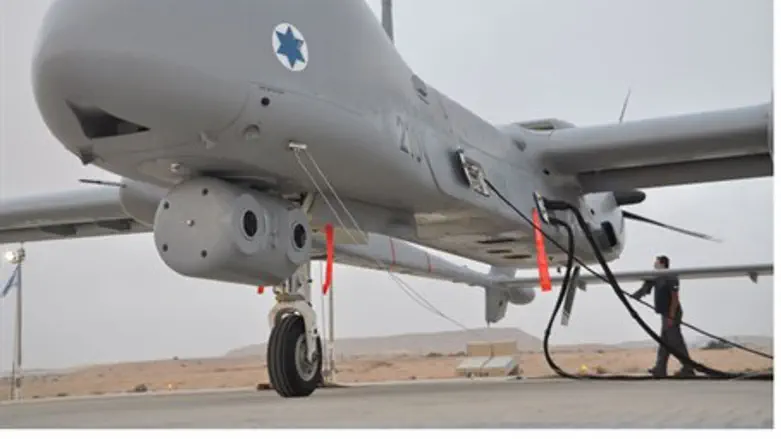
Yesterday, it was announced that Israel would be represented by its ambassador in Moscow at Russia’s annual World War II victory parade. It does not sound like such a remarkable thing, but this is an event that often draws major dignitaries - Russia did capture Berlin, after all. Israel has sent major representatives to the event in the past, but this year’s lack of a Prime Minister, President or minister of note is likely a clear repudiation of Russia’s decision to resell the S-300 missile system to the Iranians.
Last year, Israel was on the verge of selling UAV drones to Ukraine for use in its war against Russian-speaking rebels. Russia asked Israel to nix the deal, which it promptly did. Now that the S-300s are back on the table, some Israeli pundits are suggesting the same be done for the drones, especially considering Ukraine is still interested in the UAVs.
Upon catching wind of that suggestion, President Vladimir Putin warned Israel against a “counterproductive” sale of “lethal weapons” to the Ukrainians.
“It will only lead to another round of conflicts, to a rise in the number of victims — and the outcome will be the same,” Putin said in a Saturday Q&A session on Russian television.
“The whole question of sending drones to Ukraine is not an governmental position, but a suggestion made by some Russian-speaking experts in Israel,” notes Sarah Fainberg of the Institute for National Security Studies. “But in between some other comments, it was suggested possibly retaliating by selling arms to Georgia or Ukraine. They carried through and were blown up in the Russian media (maybe intentionally) and went to his television appearance on Saturday night. It’s important to remember that Putin is not responding to an official move by Israel.”
Putin’s actual tone was very reserved when he made the comments. He also did not say much.
“It’s the Israeli leadership’s choice,” Putin said. “It’s their right to do what they think is appropriate.”
“He repeatedly said to Israel that it is a defensive system and doesn’t endanger Israel’s security,” reminds Fainberg. “In addition to this, should Israel respond, sending drones to Ukraine would be a very weak and not very significant way of changing the balance of forces in Ukraine or the Middle East.”
Fainberg says several experts are still mulling over the possible responses the government might be advised to take. One of those is completely changing Israel’s position on Ukraine from one of neutrality to one where Jerusalem fully backs Kiev in the conflict against separatists.
Last year, Israel apparently angered the United States by abstaining on a UN General Assembly resolution against the Russian invasion of Crimea. At the time, it was argued that Israel was not in a position to antagonize Russia and the resolution was not a foreign policy priority for Jerusalem.
Abandoning Israel’s neutral stance would be far more significant than token gestures of UAV sales to Ukraine, says Fainberg. On the ground and in the diplomatic chambers, it would likely have very little impact, but that does not mean however that it would not mean something to Moscow.
“It would clearly indicate the neutral camp would be diminishing and Russia would be losing one additional degree of legitimacy.” It is not such a big deal to Russia practically speaking, “but it is symbolically powerful.” In addition, says Fainberg, there are a few other moves that Israel can undertake, whether in the Middle East or in Eastern Europe that would be far more annoying and significant for Russia.
Fainberg indicates that Israeli experts were apprehensive about the country’s abstention from an anti-Russian resolution last year after the invasion of Crimea. Looking back, there were other literally unspoken benefits to the move that might be lost on some in the Jewish State.
“We could say retroactively it was a foolish move on Israel’s part” not to vote against Russia and with its Western allies, says Fainberg. Yet, it carried more weight than people expected. “We were circumspect because we didn’t think Russia would acknowledge the abstention enough. But Russia did keep its neutrality during Israel’s operation in Gaza last year.”
“This was seen as a kind of reward to Israel in exchange for Israel’s neutrality.”
Russia has worked hard to improve its relationship with Israel since the end of the Cold War, so while Russia would not be affected dramatically by an Israeli shift into Ukraine’s corner – a scenario Fainberg does not advocate nor consider realistic – it would still be an affront to the Kremlin.
“It would create a crisis in ties, but would not affect Putin’s image within Russia and wouldn’t affect Russia any more than the [European] sanctions affect Russia already.”
Some have suggested Israel and Russia have had a mutual understanding about the balance of power in the region, which by the looks of thing has eroded with the S-300 announcement. Yet, there is no clear indication as of now that Russia is looking to sell even more armaments to Israel’s rivals. That could change if Israel plays too assertive a hand in responding to the sale, suggests Fainberg.
“A crisis with Israel would not harm selling of arms to Israel’s enemies. On the contrary, there are plenty of potential buyers.Yet Russia does consider Israel as a military superpower and a key actor to deal with in the region.”